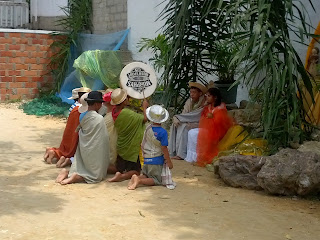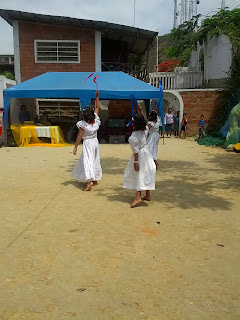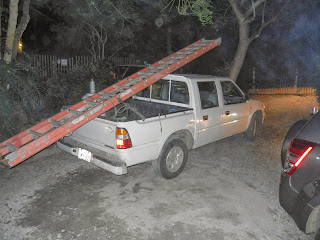Before our last trip to the States, I had a request from my friend Jeffrey (just north of Jama). He knows many of the kids in his town; they walk past his house on the way to school. He wanted to have a gift for as many of the kids as possibly, so Emily and I went to a thrift store in Florida and loaded up half of a locker with Hot Wheels, Barbie dolls and Transformer trucks. Used toys didn't cost us that much (about $50), but they are very appreciated by the kids here.
We also have some Hot Wheels for our own give-aways. Between Christmas and New Years, two kids will stand on opposite sides of the highway with rope between them. When a car slows down for a speed bump, they'll pull the rope tight to block the road and stop the car. Once the car stops, they'll come up the window and ask for money or a treat; the Hot Wheels will be great items to give.
Two of the nicest people you'll ever meet, Bob and Roxanne, host a Christmas party at their place in Manglaralto every year. What started as a small gathering years ago has turned into a massive production; this year, they served over 500 meals and gave gift bags to 375 of the neighborhood children. You can find their blog entry here:
http://bobnrox.squarespace.com/journal/2013/12/22/the-kids-christmas-party-2013-was-fabulous.html
For the Ex-pats in our area, we held a party at the Saint Lucia orphanage just north of Montañita. I say "we", but I didn't do much more than contribute financially. (I'm still the new guy here; I'm learning as I go!) Much of the work and coordination was done by our friend and fellow former-Minnesotan, Deb - she's in the middle wearing the hat:
The party started by playing Christmas carols and socializing while everyone settled in to watch the show:
First was the enactment of the Nativity story, beginning with the angel telling Maria that she would soon have a son:
Next came Maria and Joseph looking for a room at the inn:
Jesus is born! The angel goes to the fields to tell the shepherds (Baby Jesus, Maria and Joseph are on the right):
This causes the boys to break out in a festive version of the "Little Drummer Boy". I love the "Murphy's Irish Stout" drum - shameless product placement, if you ask me:
(I'm joking about the product placement, of course. These kids get by with what they have. Notice that they are all barefoot and none of the hats match or hardly fit.)
Following the Nativity enactment were two dance performances. First, three young girls in their finest white dresses performing a choreographed number:
After this, a line dance by some of the other girls. This one was, shall we say, not as choreographed (but still a lot of fun!):
After that, the big event - the visit from Papa Noel! Each child's name was called and they would go forward and receive their gift:
(Yes, that is his real beard!)
Many of the boys received soccer balls, and many of the girls received jewelry sets. All of the gift bags contains treats and balloons:
After that lunch was served to all of the children. I don't have any pictures because this was for the kids only.
It was a fun time had by all!
(pause)
But many of the children at the orphanage have not had happy lives at all.
If you do not want to read about the real lives that a couple of these children have lived prior to coming to the orphange, please do not read any further. These are honest statements about some of these children's experiences!
This was my first visit to the orphanage, and I'll relate what I've learned. Children come into the orphanage from many different places. Unless they have a mental or physical disability, I was told that they are allowed to stay only until they're 14. After that, they're on their own.
I also learned about the backgrounds of two of the children. The girl in the previous picture, Rosa Maria, was found alone on the streets of Montañita when she was four or five and has lived there for the past seven years:
She is a sweet girl but is very guarded. She sat with Emily during the Nativity performance and wrapped herself around Emily's arm once she felt that she could trust her. After she received her gift from Papa Noel, she said the only words that I could understand: "Mio! Mio! (Mine! Mine!)". She seemed to warm up to Emily and I (especially Emily) and let us protect her things for her. The orphanage is taking great care of her.
The second child's story is even sadder. I never learned his name, so I'll call him "Jared" (that was the name on the back of his shirt):
Jared was found when he was five or six; he had been kept on a leash in his parent's back yard. He had a wound in his forehead when he was found, and it's unclear whether it was a birth defect or had been inflicted. (Children with birth defects are sometimes shunned in Ecuador because it is thought that it reflects negatively on the parents.)
He was socially reclusive when he arrived at the orphanage but has learned to accept other people and make friends here; he is making great strides in learning. He does have difficulty speaking, but he does know how to communicate! Once he got his soccer ball from Pap Noel, he made it quite clear that he wanted the other boys to go play a game with him. This is their soccer field:
(That's Jared under the blue awning; the soccer field is the concrete area on the same level.)
Merry Christmas, everyone!


























































